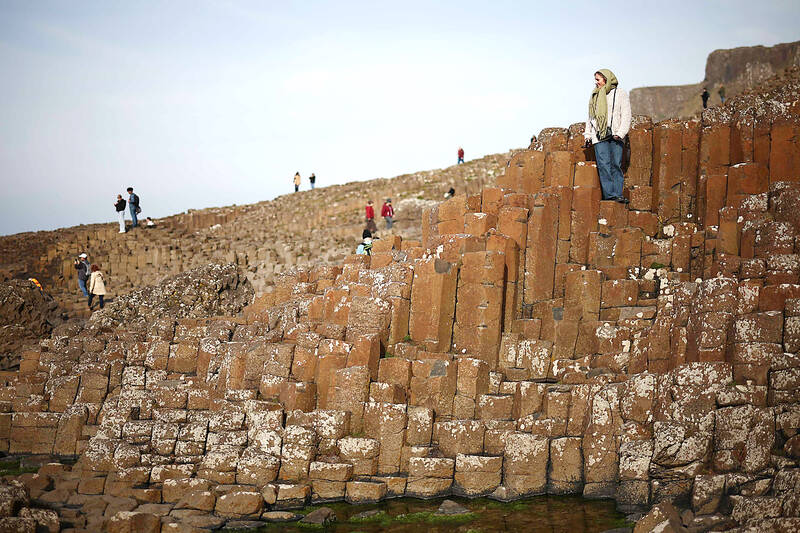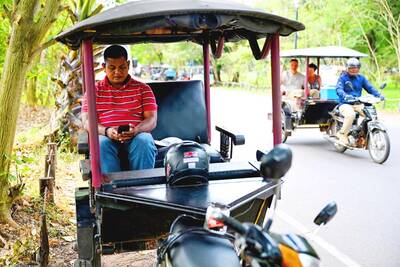Northern Ireland’s Giant Causeway draws close to 1 million visitors a year, but their habit of wedging tiny coins in cracks between the rocks — to bring love or luck — is damaging the world-famous wonder. Now, authorities are urging tourists to keep their coins in their pockets to preserve the spectacular landscape.
About 40,000 columns mark the causeway, Northern Ireland’s first UNESCO World Heritage Site.
Geologists said the natural phenomenon was created by an outpouring of basalt lava 60 million years ago.

Photo: AFP
Legend has it that the causeway was formed by Irish giant Finn McCool.
In recent decades, visitors have pushed thousands of coins into fissures in the rocks.
The gesture is “a token of love or luck,” causeway nature engagement officer Cliff Henry said.
However, the coins rapidly corrode and expand, causing the basalt to flake and leaving “unsightly” rust-colored streaks, Henry said.
He pointed to streaks on a rock and gingerly prised out a US cent with a set of keys.
“We get a lot of euros and dollar cents. But coins from literally all over the world — any currency you can think of, pretty much — we have had it here,” he said.
A report by the British Geological Survey in 2021 revealed that the coins were “doing some serious damage” and something had to be done about it, he added.
Signs are now in place around the site appealing to tourists to “leave no trace.”
“Once some visitors see other people have done it, they feel that they need to add to it,” causeway tour guide Joan Kennedy said. She and her colleagues now gently but firmly tell tourists to desist.
At the exit from the causeway, a US couple said they were “distressed” to hear of the damage the metal caused.
“Our guide mentioned as we came up that people had been putting coins into the stones. It’s really terrible to hear that,” said Robert Lewis, a 75-year-old from Florida.
“It’s kind of like damaging any kind of nature when you are doing something like that, putting something foreign into nature. It’s not good,” said his wife, Geri, 70.
As part of a US$40,000 conservation project, stone masons recently removed as many coins as they could without causing further damage from 10 test sites around the causeway.
Henry said the trial was successful and is to be expanded across the causeway.
“If we can get all those coins removed to start with that will help the situation and hopefully no more coins will be put in,” he said.
“If visitors see fewer coins in the stones and hear appeals to stop the damaging practice, the problem can maybe be solved,” Henry said. “We know that visitors love and cherish the Giant’s Causeway, and many form deep personal connections to it, so we want this natural wonder to remain special for future generations.”

The death of a former head of China’s one-child policy has been met not by tributes, but by castigation of the abandoned policy on social media this week. State media praised Peng Peiyun (彭珮雲), former head of China’s National Family Planning Commission from 1988 to 1998, as “an outstanding leader” in her work related to women and children. The reaction on Chinese social media to Peng’s death in Beijing on Sunday, just shy of her 96th birthday, was less positive. “Those children who were lost, naked, are waiting for you over there” in the afterlife, one person posted on China’s Sina Weibo platform. China’s

‘NO COUNTRY BUMPKIN’: The judge rejected arguments that former prime minister Najib Razak was an unwitting victim, saying Najib took steps to protect his position Imprisoned former Malaysian prime minister Najib Razak was yesterday convicted, following a corruption trial tied to multibillion-dollar looting of the 1Malaysia Development Berhad (1MDB) state investment fund. The nation’s high court found Najib, 72, guilty on four counts of abuse of power and 21 charges of money laundering related to more than US$700 million channeled into his personal bank accounts from the 1MDB fund. Najib denied any wrongdoing, and maintained the funds were a political donation from Saudi Arabia and that he had been misled by rogue financiers led by businessman Low Taek Jho. Low, thought to be the scandal’s mastermind, remains

Australian Prime Minister Anthony Albanese yesterday announced plans for a national bravery award to recognize civilians and first responders who confronted “the worst of evil” during an anti-Semitic terror attack that left 15 dead and has cast a heavy shadow over the nation’s holiday season. Albanese said he plans to establish a special honors system for those who placed themselves in harm’s way to help during the attack on a beachside Hanukkah celebration, like Ahmed al-Ahmed, a Syrian-Australian Muslim who disarmed one of the assailants before being wounded himself. Sajid Akram, who was killed by police during the Dec. 14 attack, and

VISHNU VANDALS: A Cambodian official accused Thailand of destroying a statue in a disputed border area, with video showing the Hindu structure being torn down The Thai military said ceasefire talks with Cambodia, set to begin yesterday, are expected to conclude with a meeting of the countries’ defense ministers on Saturday, as the two sides seek to end weeks of deadly clashes. The talks started at 4pm in Thailand’s Chanthaburi Province, which borders Cambodia. The Thai Ministry of Defense outlined several demands to be discussed ahead of the bilateral meeting of the General Border Committee (GBC) on Saturday. If secretariat-level discussions fail to reach agreement on key technical frameworks such as troop deployments, the Thai side would not proceed with the GBC meeting or sign any agreement on